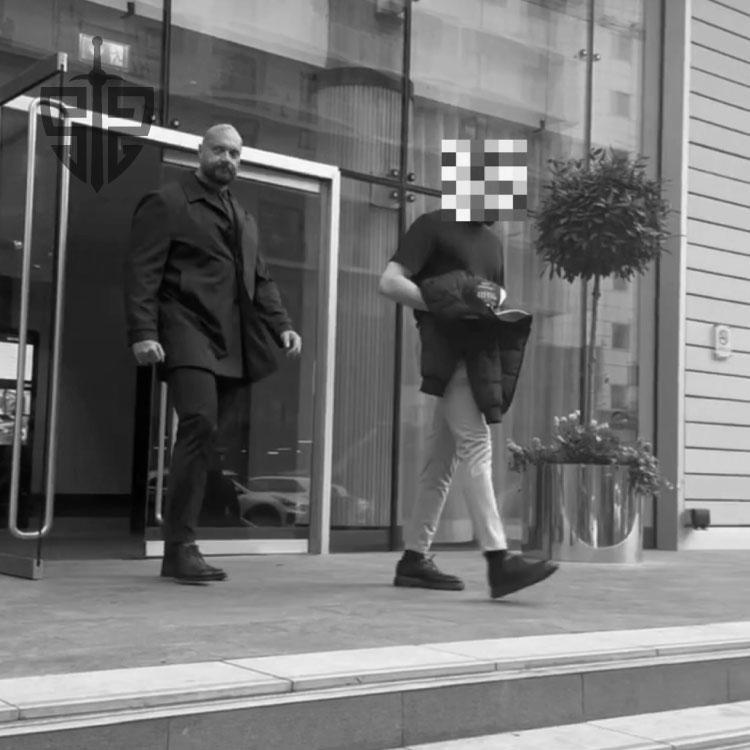
Close Protection
Ensuring your safety in Newcastle with discreet and highly trained professionals.
Call Back Request
Enter a valid mobile number and a member of our team will give you a call.
Close Protection Services
Close protection, also known as executive protection, is a specialised security service available in Newcastle for individuals facing heightened risks due to their profession or status.
Our close protection officers (CPOs) are highly skilled professionals committed to ensuring the safety and security of our clients.
Close protection involves identifying and managing potential threats to a client’s safety, including physical harm, harassment, or abduction.
The protocols for close protection are designed to provide effective security while prioritising the well-being of the client. These procedures vary depending on the circumstances, client needs, and threat levels.
Close Protection Protocols
- 1. Risk Assessment: Carrying out a thorough evaluation of potential threats and vulnerabilities to the client’s safety, considering their profile, activities, and environment.
- 2. Advance Planning: Creating detailed plans for the client’s movements and activities, including route planning, venue security assessments, and coordination with relevant parties.
- 3. Security Measures: Implementing suitable measures to mitigate identified risks, such as physical barriers, access control protocols, and surveillance systems.
- 4. Communication: Establishing clear communication channels between the security team, the client, and other key parties to enable effective coordination and emergency response.
- 5. Close Protection Techniques: Using various tactics and strategies to provide close protection, including protective formations, surveillance detection, and defensive driving.
- 6. Emergency Response: Developing and rehearsing procedures to handle emergencies such as medical incidents, hostile threats, or security breaches, ensuring the safe and prompt evacuation of the client.
- 7. Continuous Assessment: Constantly monitoring the security landscape and adjusting protocols in response to changing circumstances, emerging threats, or feedback from previous operations.
In summary, close protection protocols are designed to establish a structured, proactive security approach, enabling operatives to effectively manage risks and provide the highest level of protection.
Roles and Responsibilities
- Team Lead (TL) plays a vital role in an organisation, overseeing and coordinating team activities to ensure the successful completion of projects or tasks. read more
- Second-in-Command (2IC) is an essential role within an organisation, often serving as the primary assistant to the leader or manager. read more
- Personal Protection Officer (PPO), also known as a bodyguard or close protection operative, is a highly trained security specialist responsible for protecting individuals, particularly high-profile or at-risk clients. read more
- Personal Escort Section (PES) is a specialised security service providing close protection and escort services for high-profile individuals, dignitaries, or VIPs across various environments. PES teams, consisting of highly skilled security professionals, ensure the safety, security, and smooth transportation of their clients. read more
- Security Advance Party (SAP) is a specialised unit within a security detail tasked with conducting advance reconnaissance and preparing security measures for specific events, operations, or VIP visits. read more
- Residential Security Team (RST) is a dedicated unit specialising in protecting individuals, families, or properties within residential settings. read more
- Quick Response Force (QRF) is a specialist unit within a security or military organisation tasked with rapidly responding to emergencies, threats, or incidents as they arise. read more
- Security Drive (SD) is a specialised security operation involving mobile patrols to monitor and secure specific areas or routes. read more
- Close Protection Medic (CPM) is a highly skilled security operative trained in both close protection and emergency medical care, providing protection services while offering immediate medical assistance in high-risk situations. read more
- Individual Bodyguard (BG) is a highly trained security professional responsible for providing bespoke protection to a specific individual, commonly referred to as a principal, client, or VIP. read more

FAQs
- Q. What is close protection?
- Answer: Close protection, also known as personal protection or bodyguard services, involves safeguarding individuals who may be at risk due to their public profile, profession, wealth, or other factors. This includes high-profile individuals such as celebrities, politicians, or business executives. The aim is to ensure their safety by assessing potential threats, planning secure routes, and protecting them from harm.
- Q. Who typically requires close protection services?
- Answer: Close protection services are typically sought by individuals who face increased risks due to their status or activities. This includes politicians, celebrities, high-net-worth individuals, corporate executives, and, at times, private citizens involved in legal disputes or other sensitive matters. The service is also frequently utilised by foreign dignitaries visiting potentially hostile environments.
- Q. What are the key responsibilities of a close protection officer (CPO)?
- Answer: A close protection officer's key responsibilities include assessing potential threats, planning and implementing security strategies, escorting the client during travel, monitoring the environment for suspicious activity, and coordinating with local authorities when needed. The CPO must also be ready to respond swiftly and effectively to any immediate threats to the client’s safety.
- Q. What qualifications are required to become a close protection officer in the UK?
- Answer: In the UK, to become a close protection officer, an individual must obtain a Security Industry Authority (SIA) licence. This requires completing a recognised close protection training course covering risk assessment, surveillance awareness, conflict management, and emergency response. Additionally, candidates must undergo background checks and meet specific eligibility criteria, including being at least 18 years old.
- Q. How do close protection teams coordinate during an assignment?
- Answer: Close protection teams coordinate through detailed planning and continuous communication. They use various strategies, such as deploying advance parties to secure locations before the client’s arrival, maintaining regular radio contact, and holding briefings to ensure all team members are informed of the client’s schedule and potential risks. They also utilise secure communication channels and, when needed, work alongside local law enforcement to strengthen security measures.
Barry Bannon, Sheffield Wednesday Captain
I have used Saxon Risk Management's Managing Director, Craig, for the last three years whenever I needed personal protection. Now that Craig has put all his effort into this new company, we use them for our full-time RST (Residential Security Team). The Saxon team is extremely professional, and their skill sets are outstanding. I highly recommend Craig and Saxon to all my team and players I know around the UK. Thank YouSocial





